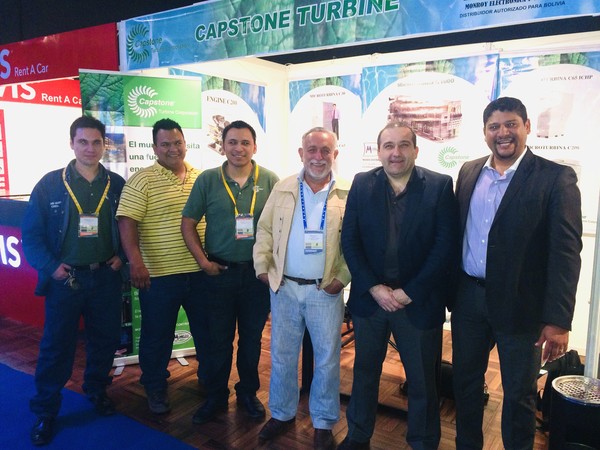Distributor Spotlight: Cenit Ltda.
Tell us a little about your organization’s history/story—how did it get started, who was involved and why was the business pursued?
Cenit Ltda., was created in 2012 as part of Monelco SRL and Canadian Energy Enterprise SRL corporate group. Since then, Cenit has progressively taken over the service lines originally operated by Monelco SRL, such as the oil services division (Wireline, Slickline and Well Testing), and Engineering, Procurement and Construction (EPC services). In this arrangement, Cenit handled the design, construction, and commissioning of the Warnes X1 plant, which is currently operated by the companies Monelco SRL and Canadian Energy Enterprise SRL.
As part of the last step in this business restructuring, in 2021, Monelco SRL transferred the rights for the distribution of Capstone Green Energy to Cenit Ltda. This was after almost 20 years of relationship with Capstone since the commissioning of the Yacuíba-Río Grande gas pipeline, known as GASYRG, project where Capstone introduced its first microturbines to Bolivia for Petrobras.
Integrating Capstone within the structure of Cenit provides an additional service line focused on electricity generation and energy efficiency within the portfolio of products and services that the company will offer from now on.
What region(s) do you serve?
Cenit is an exclusive Capstone representative of the brand and distributor in Bolivia.
Are there particular industries or markets that you serve?
Since the commissioning of the GASYRG project in the early 2000s, the company’s core business was and still is heavily focused on oil & gas clients where there are more than 74 units supporting critical infrastructure for natural gas compression and processing plants in the country. However, since 2019, the company has diversified into other industries by providing its first Factory Protection Plan (FPP) contract and introducing the first C600S unit in Bolivia for a ceramics manufacturing plant.
What are the key services you provide?
We provide reliable power generation for critical infrastructure in the oil & gas industry, as well as ongoing customer service and technical support for our clients, and project evaluation for energy efficiency applications.
What are some energy goals your customers typically want to achieve? How do you help your customers achieve them?
In general, our oil & gas clients focus on reliability. However, they also consider financial variables related to uptime, logistics for fuel and spare parts to remote locations, hours for maintenance, fuel availability in remote locations, and more. All these variables are analyzed by the clients based on their own statistics as well as comparison with conventional power sources such as diesel generators. From the industrial client’s perspective, the energy goals are way more challenging because the majority are operating within industrial hubs where they already have subsidized energy bills. That means we have to compete against energy rates between $0.06 – 0.08/kWh, whereas in commercial areas, the energy rates are around $0.15/KWh. Unfortunately, current regulation does not allow distributed power generation in commercial areas, so it is impossible to penetrate markets that need innovative energy solutions such as shopping malls, hotels, data centers and office buildings. Essentially, the country’s regulations are prohibiting the use of gas supply for power generation in these areas.
Why did you decide to become a Capstone distributor?
Because since the very beginning during and after the commissioning of the GASYRG project in the early 2000s, we realized that Capstone’s technology was remarkable since it offers a reliable, efficient, environmentally-friendly, and elegant high-tech solution for our customers.
What do you wish companies understood better about their energy-related needs?
We most want companies to understand the tremendous potential of using CHP applications to reduce their energy expenses. However, our biggest challenge is the current county’s energy regulation, which seriously limits access to the benefits and flexibility of Capstone’s technology.
If the current regulation were updated, it would be possible to inject surplus power to the grid and monetize this surplus capacity during periods when our industrial clients are using less electricity. This would make our projects way more feasible.
On the other hand, if we could use sour gasses from water treatment plants or flare gas and turn them into electricity, we would also be able to feed electricity back to the grid and monetize that energy. This would enable many new projects while also tapping all this fuel that is currently wasted and using it in a more efficient and intelligent way. It is frustrating that the regulation is not considering bidirectional power meters. That means the only entity capable of generating and selling energy is the national electric company, so distributed power generation projects like these are stagnant until the regulation is updated.
Do you have a favorite project/installation you could share?
Our favorite project so far would be the Cerámica Guadalquivir Project commissioned in 2019. This project set a remarkable milestone for Capstone with the introduction of the first-ever C600S in Bolivia, as well as the first FPP, grid connected, and CHP application.
To learn more about Cenit Ltda., visit https://www.cenitenergia.com.bo/







